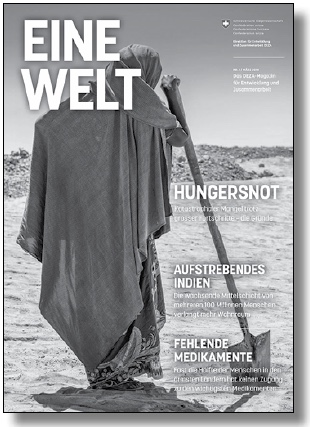“We have to stop wars”
“We have to stop wars”
Interview with David Beasley, Executive Director of the United Nations World Food Programme*
rt. The latest issue of the Swiss Agency for Development and Cooperation (SDC) magazine “Eine Welt” (One World) in March 2018 makes it abundantly clear that famines are not a coincidence, but are closely linked to armed conflicts. In his preface, SDC Director-General Manuel Sager emphasises the role of wars: “Starvation is […] not simply the sad end of a human destiny, but it is caused or at least accepted by humans”. With this statement, he refers to David Beasley, Executive Director of the United Nations World Food Programme (WFP), who summarizes the current situation in an interview with Jens Lundsgaard-Hansen.


“Eine Welt” : Mr Beasley, the number of hungry people has increased again after years of decline. What is going wrong?
David Beasley: In fact, in the last two decades we have made great progress in the fight against hunger. Unfortunately, however, development is currently going in the wrong direction. Around 108 million people suffered from severe food insecurity in 2016, compared with 80 million the year before. The main reason for this situation are man-made conflicts. That is why 27 million people are currently facing starvation. This is the biggest humanitarian crisis since the Second World War.
South Sudan, Somalia, Yemen, Syria and other conflict regions – the number of conflicts and trouble spots is high. Are you still able to set priorities or do you feel like Sisyphus?
More than ever, we need new impetus to fight hunger worldwide in a joint effort. The first and most important impulse would be to bring conflicts to an end. The situation of food security in the regions you have mentioned is primarily determined by conflicts. We are doing everything to help people to understand the dimension of these crises how much they affect their lives and how important it is for global stability to end hunger. Hunger contributes significantly to global instability and is one of the triggers of the current migration crisis. Our research shows that an increase in food insecurity of one percent leads to an increase in migration of two percent.
Do you receive the necessary support from the donor countries? What about Switzerland?
Fact is that the current crisis requires more money. The response of our donor countries was enormous. As far as Switzerland is concerned, it was and is a great partner. Since 2012, it has ranked among the top ten donor countries. Over the years, Switzerland has become an important ally of the WFP, who strongly supports the new strategy of the WFP. This goes beyond cash contributions and benefits in kind.
The SDC supports the WFP in building bridges between humanitarian aid and development cooperation in crises and disasters. The SDC also supports new, innovative concepts, such as cash transfers to people in need.
In face of all these crises, does the WFP have sufficient resources and power to fight not only the symptoms but also the causes of hunger?
In the long term, the WFP pursues the goal to contribute to the economic development of the countries and societies in which we operate. We are working to provide more children with school meals and to involve physically healthy adults in the development and support of their regions. The World Food Programme will always be strong in emergencies, but to achieve lasting food security we need to improve the living conditions of men, women, boys and girls in a joint and sustainable effort. By the way, everybody can help. Even the smallest donation has an effect, for example via our app “Share The Meal” (www.sharethemeal.org).
What contributions does the WFP make in connection with chronic food insecurity and malnutrition?
We provide our knowledge to governments and actively supporting them in the fight against hunger. Our experts on school meals work together with countries in Africa, Asia and Latin America to set up and manage their own programs. The aim is to bring poor children to school and to keep them there so that they get a better education and a chance for a better future.
The goal of the „Agenda 2030“ is clear: “zero hunger” by 2030. By 2050, we will be two billion more people than today. Do you believe in this goal, or is it not a little illusory?
I strongly believe in this goal. That is why men and women are working for the WFP every day. Quite a few people accept the risks to their personal safety, if they help those who are most vulnerable. Therefore, we will never lose sight of the goal of “Agenda 2030”. However, at the same time, I have to admit that we will never really be able to end hunger unless we do not end wars. The goal of “Agenda 2030” is simply not attainable if we cannot reduce the conflicts drastically. These conflicts always lead to great food insecurity and vice versa. There is more than enough wealth in the world to feed every human being. Nevertheless, when so much energy is flowing into conflicts, it is not possible to make real progress towards our overarching goal. •
* David Beasley has been Executive Director of the United Nations World Food Programme (WFP) since April 2017. Each year this programme provides care for around 80 million people suffering from severe hunger. David Beasley worked for more than 40 years in politics, business, and public service and got involved in economic development and humanitarian assistance to those most in need. Between 1995 and 1999, he was Governor of the US state of South Carolina.
Source: Eine Welt. Das DEZA Magazin für Entwicklung und Zusammenarbeit (One World. The SDC Magazine for Development and Cooperation) No. 1 / March 2018
Publisher: Swiss Agency for Development and Cooperation (SDC) of the Federal Department of Foreign Affairs (FDFA)